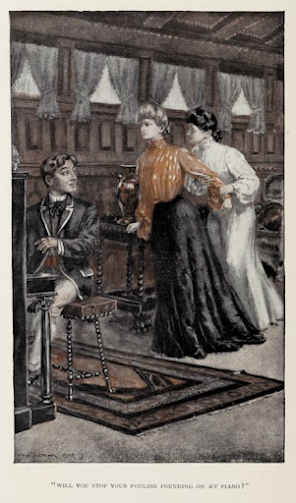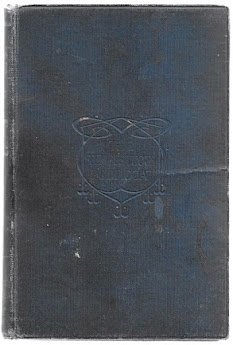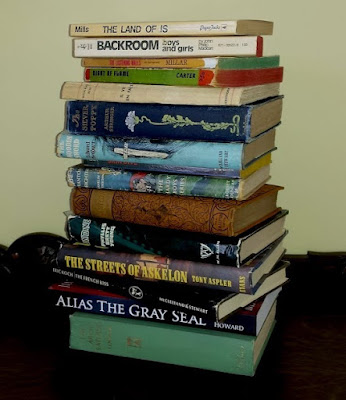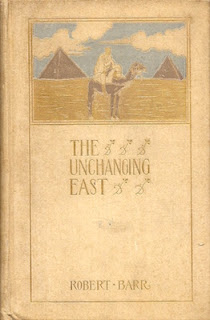The Tempestuous Petticoat [A Chicago Princess]
Robert Barr
London: Collins, [1908]
200 pages
Proper Englishman Rupert Tremorne serves as protagonist and narrator. If he is to be believed – I see no reason why not – Tremorne once held a good position in the diplomatic service, only to resign after receiving an inheritance of £100,000 (roughly £9.9 million today). Ten months later, he lost the entire fortune to an unscrupulous American businessman.
The Tempestuous Petticoat opens in Nagasaki, where Tremorne had hoped to revive his career. Sadly, his best efforts failed. The reader finds him heavily indebted to Yansan, the sort of patient, polite landlord found only in fiction. The two are discussing their relationship when Tremorne spots a yacht and announces that his "ship has come in." Here I note that yachts aren't ships. In any case, a vessel sails into Nagasaki's harbour, and Tremorne's life is forever changed.
The yacht belongs to Chicago industrialist and investor Silas K. Hemster. Tremorne climbs its rope ladder, makes for its owner, and begins selling himself as a jack of all trades. This does not impress. “You spread yourself out too thin, my son," says Hemster. "A man who can do everything can do nothing.
We specialise in our country. I hire men who
can do only one thing, and do that thing better
than anybody else.”
Recognizing Tremorne's true talents, Hemster makes him his personal secretary. The Englishman's first task is to accompany gorgeous Gertrude Hemster, his new employer's sole heir, on a tour of Nagasaki's finest shops. The two get along famously, particularly after Gertrude learns that Tremorne has met with the Emperor of Japan. Unfortunately, she takes this to mean that her father's new hire and the Mikado are fast friends.
How to explain this misunderstanding? Wishful thinking perhaps?
At twenty-one – "every one says I don't look more than seventeen" – Gertrude has enjoyed a great many privileges: exclusive schools, the best hotels, and the finest restaurants. She has met British lords, French counts, German barons, and Italian princes, but as Hemster explains:
"Gertie got tired of them, and, as she is an
ambitious girl and a real lady, she determined
to strike higher, and so, when we bought this
yacht and came abroad again, she determined
to go in for Kings, so I’ve been on a King hunt
I ever since, and to tell the truth it has cost me a
lot of money, and I don’t like it. Not that I
mind the money if it resulted in anything, but
it hasn’t resulted in anything; that is, it hasn’t
amounted to much."
Upon realizing her mistake, Gertrude sets the crockery flying. The following day, she confronts Tremorne for daring to play the yacht's piano. Miss Hilda Stretton, orphaned daughter of Silas Hemster's closest friend, tries to defuse the situation:
Miss Hemster whirled
around like an enraged tigress, and struck
her companion a blow that would have landed
on her cheek had not the victim suddenly and
instinctively raised an arm to protect her face.
Then with the viciousness of a harridan of Drury
Lane Miss Hemster grasped the shrinking girl
by the shoulders, and shook her as a terrier
does a rat, finally forcing her down into a
seat by the side of the table.
The scene ends in gunfire.
 |
| A Francis P. Wightman illustration from the 1905 Methuen edition. |
Understandably, any interest Tremorne had for Gertrude shifts to Hilda. But do not be confused, Gertrude is the titular character.
A confession: I purchased The Tempestuous Petticoat for its title, taken from Robert Herrick's 17th-century poem 'Delight in Disorder':
 |
from Elizabethan Songs "in honour of love and beautie"
Edmund Henry Garrett, ed
London: James R. Osgoode, McIloine & Co., 1891 |
I'd hoped that the novel might prove ribald and naughty; something unique in Victorian Canada. Sadly, The Tempestuous Petticoat is typical Barr, as recognized in the pages of The Bookman (April 1905):
There are some authors whom it hardly seems necessary to review. They are definitely "placed" by their previous work. The reader knows exactly what to expect; a particular book may be a little above or below the general average, but it is unlikely either to surprise or disappoint. Among the number of these writers whose works may be taken on trust, Mr. Barr may certainly claim a place. It must be years since he wrote a bad novel, if indeed he ever wrote anything approaching a bad novel, but it is equally unlikely that he will ever produce any work much above the average level of its predecessors. The faithful reader can go to the circulating library and ask for Mr. Barr's "latest" with the comfortable assurance that he will not be disappointed. In a now famous phrase, "those who like this sort of thing will find the sort of thing they like," or in other words, those who like Robert Barr will like "The Tempestuous Petticoat." This may sound like faint praise, but in deference to Mr. Barr's numerous admirers we hasten to add that we ourselves are amongst that number.
Not a bad novel, The Tempestuous Petticoat is very much on par with the Barr's other work; Revenge! rises above, In the Midst of Alarms is a touch below, while 'One Day's Courtship' and 'The Heralds of Fame' rest on the very same plane. This means that it is superior to most Canadian novels of the time. Anyone looking for a silly, well-written diversion with plenty of flirtatious banter will be satisfied; anyone looking for sweet disorder in the dress will not.
Still, I do like the title.
Object: An unassuming petite edition in dark blue boards, ideal for a lady's handbag or gentleman's waistcoat pocket, my copy is the eighteenth title in Collins' "'Handy' Modern Fiction" series. According to the publisher, "'Handy' Modern Fiction" was "the greatest revolution the world has ever witnessed."
Robespierre, Washington, Lenin, and Mao Zedong take note.
Surprisingly, for something so cheap, the title page (top of post) and frontispiece (below) are in full-colour on glossy paper.
Object and Access: I've yet to find evidence that this novel was ever serialized. If true, The Tempestuous Petticoat first appeared in June, 1904 as A Chicago Princess (New York: Stokes). Methuen's first British edition followed the next year. My Collins' "Handy" Modern Fiction copy was published in April, 1908. It has been out of print ever since.
If you see them, buy the Stokes or Methuen editions; they have better bindings, clearer type, and each has four colour plates by Francis P. Wightman.
Sadly, as of this writing, no Stokes or Methuens are listed for sale online. One copy of the Collins edition is on offer at £25.00. Mine was purchased two years ago from an Oxfordshire bookseller. Price £2.00.
Several editions of the novel can be accessed – gratis – at the Internet Archive. I recommend the Methuen.




















































